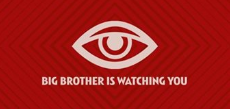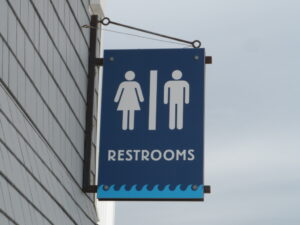A few months ago, I would not have been able to tell you what my favorite high school book has been. I would have stared blankly, my mind grasping for titles and authors. I think it is fair to assume that many other students would have the same reaction. But it is not that the books in our curriculum themselves are not interesting, but that we are under pressure to read them. I think that oftentimes, that obligation extracts the joy out of reading a good book. But alas, a good book is a good book.
1984 was the first book that Mrs. Kenney introduced to our AP Language and Composition Class. We had read a few of Orwell’s essays before, the most memorable being Politics and the English Language. This essay is written as if Orwell created the English language. He includes scholarly evidence to explain the “correct” use of English and publicly criticizes those works that do not fit his utopian definition. After reading it, one may see him as extremely intelligent, cocky, or a mix of both. His work both impressed and intimidated me; I was left feeling as though I wrote in all the wrong ways. So when I read Orwell’s name printed on the front of 1984 as I walked back from the library, I was expecting a . . . dense read, to say the least.
I was right in my assumption, but it is dense in the best way. 1984 was Orwell’s warning against totalitarianism. It is set in Oceania, a warring totalitarian state. The ruling Party is led by Big Brother, and the government brainwashes their people into believing anything they claim as fact. The three core values of Oceania are “War is Peace, Freedom is Slavery, and Ignorance is Strength.” The Party imposes Newspeak as the new universal language, eliminating any “unnecessary” terms that may lead to independent thought. The Thought Police are responsible for punishing anyone who even slightly puts the Party at risk. There is also constant surveillance and tight routines; the Party ultimately controls every aspect of citizens’ lives. The book focuses on the main character Winston Smith, an intelligent Party member who silently questions everything about the society he has been raised in. He begins to keep a diary, which is against Party policy, and records his memories and experiences. Eventually, he realizes that he is compiling a list of things that disprove the Party’s legitimacy. He begins to rebel in his thoughts and desires, and falls in love with a like-minded rebel, Julia. Together, they secretly share their real opinions and analyze every one of the Party’s flaws. Yet even though their clever minds may see through the Party’s facade, the rest of society does not, and their time together is limited.
I feel as though I have made it abundantly clear that I had low expectations of this novel. But I loved it. Although the majority of classes do not currently have it in their curriculum, I believe it is a must-have. This novel is layered with hidden meanings and is formulated around an emotional and exciting plot. While I was following Winston’s journey I genuinely enjoyed immersing myself in his world. I found myself choosing to read 1984 in my free time and listening to it on audio as I cleaned my room or emptied the dishwasher. Even though it could be argued that this novel was written for an older audience, I find that it is perfect for high schoolers, as we can identify with the desire to share our opinions and be angsty amidst society’s expectations. This book is challenging, frustrating, and satisfying all at once: It is worth the read.
I believe that a good book will tear you apart at the end. You are either left heartbroken that you have to part from a literary fantasy you immersed yourself in, or tortured by a perfect ending demolished with just a few words. But I can’t tell you which category 1984 falls under; that’s for you to discover.






